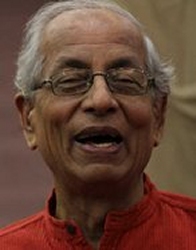
|   |

|   |
 e-mail: ukb7@rediffmail.com Bonding with Global Theatre Photos courtesy: Avishek Ghosh April 8, 2018 The stage is a reflection of society and in order to emphasize its importance, every year on March 27, World Theatre Day is celebrated. Initiated in 1961 by the UNESCO-sponsored International Theatre Institute (ITI), this day is annually celebrated by ITI Centres in different countries and the international theatre community at large. It was entirely appropriate that the eastern metropolis paid its own tribute to this day with a new adaptation from the American wizard playwright Eugene O'Neill's 1956 play - as staged in the Broadway a good three years after his death - Long Day's Journey into Night that was acknowledged as the Nobel Laureate's magnum opus and earned him a posthumous Pulitzer Prize. Long Day's Journey into Night takes place in four acts on a single day - supposedly in August 1912 - - from around 8:30am up to midnight. The setting is the crumbling seaside Connecticut home, Monte Cristo Cottage, of O'Neill's father. The four main characters are the semi-autobiographical representations of O'Neill himself, his elder brother, and their parents. In a nutshell, the play portrays a decadent American family in a ferociously negative light as the parents and two sons express accusations, blame and resentments: qualities which are often paired with pathetic and self-defeating attempts at affection, encouragement, tenderness and yearnings for things to be otherwise. The gnawing pain of the family is made the worse by their depth of self-understanding and self-analysis, combined with a brutal honesty - - as they see it - - and an ability to boldly express themselves. The story primarily deals with the mother's addiction to morphine, compounded by the family's addiction to whiskey, the father's miserliness, the older brother's licentiousness and the younger sibling's illness. 



Deerghya Din Doghdho Raat, presented by Theatre Workshop on March 27 in Kolkata, used the Bengali adaptation by the well-known dramatist Chandan Sen. The script thrives in its charming Indian mise-scene in a fairly cozy family milieu, but seems to have missed the original's depiction of all-pervading decadence and gloom by a barge pole. While O'Neill's pointer was primarily to the deadening impact of drug addiction and alcoholism, Sen appeared to miss the point entirely. Instead, he portrays Deepesh Sanyal as an aged actor - mouthing Macbeth and Hamlet's soliloquies from time to time, in addition to Bengal's own Girish Ghosh in Prafulla - and also as a failed father, unable to face the son and the daughter's pointed accusations. The mother Charu has bouts of seasonal cough but nothing particularly serious. What is added in the Bengali version is the elder son Rupesh's awareness of his illegitimacy of birth and being brought up by a foster mother; the younger sibling Buli's failed marriage and constant nagging at the parents for not giving her timely guidance; and mother Charu's raving memory of an ignoble attempted elopement in the past accompanying Dibanath Maity, a caretaker, with the latter subsequently "done to death" and Charu's nocturnal hallucinations. Surely the above 'add-ons' cannot be objectionable in an adaptation, but for the simple fact that they caused a critical overload of events that could hardly be done justice to in a play confined to only one calendar day, as per O'Neill's original. In the bargain, none of these extra events got to the point of resolution. To make confusion worse confounded, Buli's estranged husband turned up late at night with the unwarranted fore-knowledge that the ancestral property was being sold next day. Rupen's guilt ridden affairs with a first cousin Angira - also planning to appear - - loomed large on the horizon; and why the respectable Charu should ever have contemplated an earlier elopement with a menial remained questionable. Directed by the thespian Ashok Mukhopadhyay and using an imaginative setting, the play struggled valiantly to portray its complex scenario as best as it could and would surely improve with repeat shows after the premiere. Both Ashok as Deepesh and another veteran Suranjana Dasgupta as Charu were quite adequate. Bindiya Ghosh as the long employed maid (unlike the temporary summer maid as in the original) emerged surprisingly well in a singing role. The two siblings needed more attention to voice control and intonations. As to why the play should have resorted to a resolution of all the accumulated problems by suddenly deciding to retain the derelict property, with an unexpected shift from realistic acting to a highly stylised joint recitation of Shakti Chattopadhyay's classic poem, We can leave, but why must we… to bring the curtains down, remained unfathomable. A play of classic dimensions of this kind needed more attention to "integrity of time and action" even in an adapted version and it was a great pity that an important opportunity was lost, or almost.  Dr. Utpal K Banerjee is a scholar-commentator on performing arts over last four decades. He has authored 23 books on Indian art and culture, and 10 on Tagore studies. He served IGNCA as National Project Director, was a Tagore Research Scholar and is recipient of Padma Shri. Post your comments Please provide your name and email id when you use the Anonymous profile in the blog to post a comment. All appropriate comments posted with name & email id in the blog will also be featured in the site. |